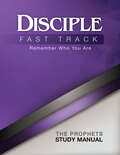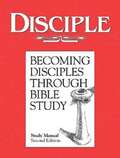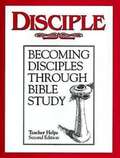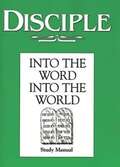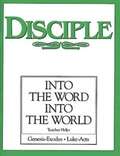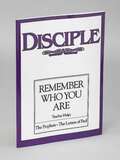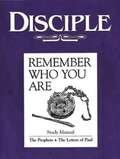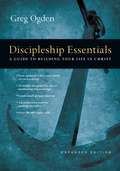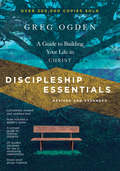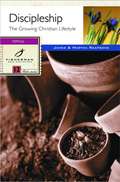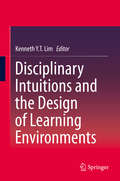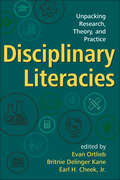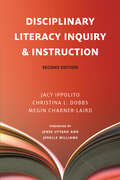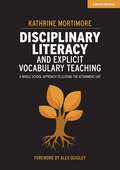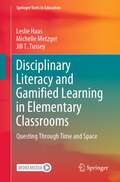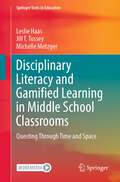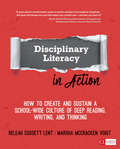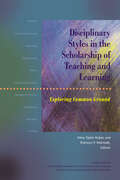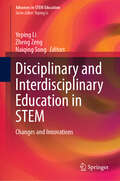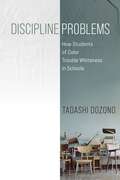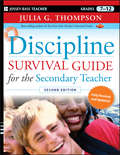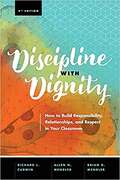- Table View
- List View
Disciple Fast Track Remember Who You Are The Prophets Study Manual
by Richard B. Wilke Susan Wilke Fuquay Elaine Friedrich Julia Kitchens Wilke TrustThis 12-week study immerses readers in the Old Testament Prophets.This Disciple Fast Track is an adaptation of the original, bestselling Disciple Bible Study: Remember Who You Are. The study is ideal for busy people who want to fit an in-depth Bible study into their schedule. The study retains the familiar Disciple format with its theme word, theme verse, statement of the human condition, daily and weekly assignments, and prayer.This study examines the connection between memory and identity as the people of God. Participants will find common themes, including calls to remember, calls to repent, calls for renewal, and calls for community.In this Study Manual, there are 12 sessions on the Old Testament Major and Minor Prophets (except Daniel). The prophets are continually calling hearers and readers back to their God and to a sense of who they are as a people "set apart." Designed to establish the historical context in which the prophets spoke for God, daily reading assignments draw also on the books of Deuteronomy through Chronicles. Readers will encounter "The Word of the Lord," with comments on Scripture and amplification of meaning, as well as "Marks of Obedient Community," which identifies beliefs, attitudes, and actions of the obeying community. "Marks" is the faith response to "Our Human Condition."Classes meet for a total of 24 weeks, studying the Prophets and the letters traditionally attributed to Paul for 12 sessions each. Preparation is manageable, with 3–5 chapters of the Bible to read each day.Minimal additional preparation is needed for the leader—just prepare handouts and follow the Leader Guide. Weekly sessions last 75 minutes. Hosts will provide 3-5 minute video insights related to the week's session. Flexible for use with small groups of 8–14, or for large groups of 15–100.
Disciple I Becoming Disciples Through Bible Study: Second Edition (Disciple Ser.)
by Richard B. Wilke Julia Kitchens Wilke TrustDISCIPLE is a program of disciplined Bible study aimed at developing strong Christian leaders. Thestudy gives the Old and New Testaments equal time, emphasizing thewholeness of the Bible as a revelation of God. DISCIPLE draws upon thework of scholars, the personal Bible reading and study of theparticipant, and dynamic group discussion to aid understanding of theBible. The first study in the program is DISCIPLE: BECOMINGDISCIPLES THROUGH BIBLE STUDY, a thirty-four week overview of the entireBible. Commitment and Time InvolvedThreeand one-half to four hours of independent study each week (40 minutesdaily for leaders and 30 minutes daily for group members) in preparationfor weekly group meetings. Attendance at weekly 2.5 hour meetings.Study ManualEachmember of the group needs a study manual and a Bible. The Bible is thetext for the study and the study manual will guide group members intheir study and preparation for the weekly group session. The studymanual also includes suggestions for individual and study-relatedactivities. Space is provided for taking notes while reading Scripture,for recording thoughts and questions arising out of daily study, and fornotes during the weekly group session.The titles of thesessions along with theme words and theme verses, and major persons,events, and topics will set the sequence of the biblical story in theminds of the participants. The principal Scripture for each sessionfollows the chronological movement of the biblical story.We recommend the New Interpreters Study BibleMore Questions? Visit www.cokesbury.com/disciple.
Disciple I Becoming Disciples Through Bible Study: Second Edition (Disciple Ser.)
by VariousDISCIPLEis a program of disciplined Bible study aimed at developing strong Christianleaders. The study gives the Old and New Testaments equal time, emphasizingthe wholeness of the Bible as a revelation of God. DISCIPLE draws upon the workof scholars, the personal Bible reading and study of the participant, anddynamic group discussion to aid understanding of the Bible. Thefirst study in the program is DISCIPLE: Becoming Disciples Through Bible Study,a thirty-four week overview of the entire Bible. Commitment and TimeInvolved Three and one-half to four hours of independent study each week (40 minutes daily for leaders and 30 minutes daily for group members) in preparation for weekly group meetings. Attendance at weekly 2.5 hour meetings.TeacherHelpsDiscipleI Teacher Helps guides Disciple group leaders through eachsession. Inthe front of the Teacher Helps is a section of general information oneffectively using the study manual, preparing to lead the weekly group meeting,following the proper schedule and procedure, tips for leadingdiscussion, and suggestions for creating and maintaining a caringclimate in the study group.Processsuggestions in the teacher helps enable full participation by allmembers of the group as a result of disciplined daily study. A one-page plan foreach of the weekly group sessions follows an established schedule and procedure,with an amount of time designated for each section in the plan. Each sessionplan includes suggestions for group study of a selected passage ofScripture.
Disciple II Into the Word Into the World: Into the Word Into the World (Disciple Ser.)
by Duane A. EwersThe Disciple: Into the Word Into the World Study Manual retains the familiar DISCIPLE format with its theme word, theme verse, statement of the human condition, daily and weekly assignments, and prayer for daily use.At some point in their study of every lesson, readers make decisions about how they will respond to Scripture in terms of ministry in the world. Each week persons will be guided in experiencing the gift of Sabbath rest and renewal.Each member of the group needs a study manual and a Bible. The Bible is the text for the study and the study manual will guide group members in their study and preparation for the weekly group session. The study manual also includes suggestions for individual research and study-related activities. Space is provided for taking notes while reading Scripture, for recording thoughts and questions arising out of daily study, and for notes during the weekly group session.The titles of the sessions along with theme words and theme verses, and major persons, events, and topics will set the sequence of the biblical story in the minds of the participants. The principal Scripture for each session follows the chronological movement of the biblical story.Commitment and Time Involved 32 week study Three and one-half to four hours of independent study each week (40 minutes daily for leaders and 30 minutes daily for group members) in preparation for weekly group meetings. Attendance at weekly 2.5 hour meetingsDisciple: Into the Word Into the World is the second study in the four-phase Disciple program and is prepared for those who are graduates of Disciple: Becoming Disciples Through Bible Study.This study proclaims the transforming power of Scripture while teaching Bible study skills that take participants deeper into the Scripture. The importance of keeping Bible study related to witness is reinforced while participants are encouraged to practice spiritual disciplines arising out of Scripture for the purpose of changing habits and transforming lives. The study also emphasizes the rhythm of coming to God and going for God, of being in the Word and in the world individually and corporately. This study understands the growing Christian as under discipline in community and in ministry to the world. Disciple: Into the Word Into the World approaches all experiences of life as opportunities for faithful witness and service.
Disciple II Into the Word Into the World: Into the Word Into the World (Disciple Ser.)
by Duane A. EwersDISCIPLE II: Into the Word Into the World is the second study in the four-phase Disciple program and is prepared for those who are graduates of Disciple I: Becoming Disciples Through Bible Study. This study proclaims the transforming power of Scripture while teaching Bible study skills that take participants deeper into the Scripture. The importance of keeping Bible study related to witness is reinforced while participants are encouraged to practice spiritual disciplines arising out of Scripture for the purpose of changing habits and transforming lives. The study also emphasizes the rhythm of coming to God and going for God, of being in the Word and in the world individually and corporately. This study understands the growing Christian as under discipline in community and in ministry to the world. Into the Word Into the World approaches all experiences of life as opportunities for faithful witness and service.Commitment and Time Involved 32 week study Three and one-half to four hours of independent study each week (40 minutes daily for leaders and 30 minutes daily for group members) in preparation for weekly group meetings. Attendance at weekly 2.5 hour meetings.Teacher HelpsThe Teacher Helps provides an outline for an orientation session and process suggestions for each of the weekly group sessions. It does not contain new or additional content for the leader to present to the group. A one-page teaching plan is provided for each session. Weekly group sessions follow a set pattern, with designated amounts of time for each step. Suggestions for group activity are specific and clearly related to the Scripture being studied. Ample questions for use in discussion are included.Specific instructions are included for making weekly assignments to individuals for use of the basic resource library.In the front of the teacher helps is a section of general information on effectively using the study manual, preparing to lead the weekly group meeting, following the proper schedule and procedure, tips for leading discussion, and suggestions for creating and maintaining a caring climate in the study group.Process suggestions in the teacher helps enable full participation by all members of the group as a result of disciplined daily study. A one-page plan for each of the weekly group sessions follows an established schedule and procedure, with an amount of time designated for each section in the plan. Each session plan includes suggestions for group study of a selected passage of Scripture.
Disciple III Remember Who You Are: The Prophets - The Letters of Paul (Disciple Ser.)
by Nellie M. MoserTeacher HelpsThe Teacher Helps provides an outline for an orientation session and process suggestions for each of the weekly group sessions. It does not contain new or additional content for the leader to present to the group. A one-page teaching plan is provided for each session. Weekly group sessions follow a set pattern, with designated amounts of time for each step. Suggestions for group activity are specific and clearly related to the Scripture being studied. In the front of the teacher helps is a section of general information on effectively using the study manual, preparing to lead the weekly group meeting, following the proper schedule and procedure, tips for leading discussion, and suggestions for creating and maintaining a caring climate in the study group.Process suggestions in the teacher helps enable full participation by all members of the group as a result of disciplined daily study. A one-page plan for each of the weekly group sessions follows an established schedule and procedure, with an amount of time designated for each section in the plan. Each session plan includes suggestions for group study of a selected passage of Scripture.Disciple III Remember Who You Are is the third study in the four-phase DISCIPLE program. The driving idea in this study is the connection between memory and identity as the people of God. The word You in the title is meant to be heard both in its singular form (the individual) and its plural form (the community). We are a community of memory. Participants in this 32 week study will read the major and minor Old Testament prophets, with the exception of Daniel, and will read the thirteen Letters traditionally attributed to Paul. To establish the historical context in which the prophets spoke for God, daily reading assignments draw also on the books of Deuteronomy through Chronicles.Several themes weave their way through the study – the call to remember; the call to repentance; the need for renewed vision; and the place of community. The prophets and Paul are continually calling hearers and readers back to their God and to a sense of who they are as a people"set apart."Commitment and Time Involved 32 week study Three and one-half to four hours of independent study each week (40 minutes daily for leaders and 30 minutes daily for group members) in preparation for weekly group meetings. Attendance at weekly 2.5 hour meetings
Disciple III Remember Who You Are: The Prophets - The Letters of Paul (Disciple Ser.)
by Richard B. Wilke Richard B. WilkeThe Disciple III Remember Who You Are: Study Manual combines direction and information enabling study of the text – the Bible.Two titles in the commentary section of the manual reflect ideas central to the prophets and Paul's letters. "The Word of the Lord" picks up a familiar phrase from the prophets – a clear statement of their calling: They spoke (and speak) for God.Each member of the group needs a study manual and a Bible. The Bible is the text for the study and the study manual will guide group members in their study and preparation for the weekly group session. The study manual also includes suggestions for individual research and study-related activities. Space is provided for taking notes while reading Scripture, for recording thoughts and questions arising out of daily study, and for notes during the weekly group session.The titles of the sessions along with theme words and theme verses, and major persons, events, and topics will set the sequence of the biblical story in the minds of the participants. The principal Scripture for each session follows the chronological movement of the biblical story.Disciple III Remember Who You Are is the third study in the four-phase DISCIPLE program. The driving idea in this study is the connection between memory and identity as the people of God. The word You in the title is meant to be heard both in its singular form (the individual) and its plural form (the community). We are a community of memory. Participants in this 32 week study will read the major and minor Old Testament prophets, with the exception of Daniel, and will read the thirteen Letters traditionally attributed to Paul. To establish the historical context in which the prophets spoke for God, daily reading assignments draw also on the books of Deuteronomy through Chronicles.Several themes weave their way through the study – the call to remember; the call to repentance; the need for renewed vision; and the place of community. The prophets and Paul are continually calling hearers and readers back to their God and to a sense of who they are as a people"set apart."Commitment and Time Involved 32 week study Three and one-half to four hours of independent study each week (40 minutes daily for leaders and 30 minutes daily for group members) in preparation for weekly group meetings. Attendance at weekly 2.5 hour meetings
Discipleship Essentials: A Guide to Building Your Life in Christ
by Greg OgdenA 2014 ECPA Christian Book Award Finalist Discover the fullness of life in Christ. We grow in Christ as we seek him together. Jesus' own pattern of disciple-making was to be intimately involved with others and allow life to rub against life. By gathering in twos or threes to study the Bible and encourage one another, we most closely follow Jesus' example with the twelve disciples. This workbook by Greg Ogden is a tool designed to help you follow this pattern Jesus drew for us. Working through it will deepen your knowledge of essential Christian teaching and strengthen your faith. Each week contains the following elements:a core truth presented in a question-answer format a memory verse and accompanying study a field-tested inductive Bible study a reading on the theme for the week questions to draw out key principles in the reading. This material is designed for groups of three. It has also been used successfully as an individual study program, a one-on-one disciplining tool and small group curriculum. Jesus had a big enough vision to think small. Focusing on a few did not limit his influence. Rather, it expanded it. Discipleship Essentials is designed to help us influence others as Jesus did--by investing in a few. Second edition includes a new foreword by the author. These studies are for both individuals and groups.
Discipleship Essentials: A Guide to Building Your Life in Christ (The Essentials Set)
by Greg OgdenWe grow in Christ as we seek him together. Jesus' own pattern of disciple-making was to be intimately involved with others and allow life to rub against life. By gathering in twos or threes to study the Bible and encourage one another, we most closely follow Jesus' example with the twelve disciples. This workbook by Greg Ogden is a tool designed to help you follow this pattern Jesus drew for us. Working through it will deepen your knowledge of essential Christian teaching and strengthen your faith. Each week contains the following elements: a core truth presented in a question-and-answer format a memory verse and accompanying study a field-tested inductive Bible study a reading on the theme for the week questions to draw out key principles in the reading This material is designed for groups of three. It has also been used successfully as an individual study program, a one-on-one discipling tool, and small group curriculum. This expanded and completely updated edition includes a new guide for leaders. Jesus had a big enough vision to think small. Focusing on a few did not limit his influence. Rather, it expanded it. Discipleship Essentials is designed to help us influence others as Jesus did—by investing in a few.
Discipleship: The Growing Christian's Lifestyle (Fisherman Bible Studyguide Series)
by James Reapsome Martha ReapsomeReaders will explore what it means to be a follower of Jesus by studying two New Testament personalities who demonstrated discipleship.From the Trade Paperback edition.
Disciplinary Intuitions and the Design of Learning Environments
by Kenneth Y. T. LimMany of the chapters within draw frequent and explicit linkages to curriculum design, from the premise of the need to go beyond addressing the conceptions of learners, to seeking to understand the substrate upon which these conceptions are founded. The argument is made that this substrate comprises the particular set of lived experiences of each learner, and how - because these lived experiences are as tacit as they are diverse - designing curriculum around misconceptions and preconceptions alone would not lead to enduring understanding from first principles. From this perspective, Disciplinary Intuitions constitute an exciting field at the nexus of learning theories and curriculum design.
Disciplinary Literacies: Unpacking Research, Theory, and Practice
by Evan Ortlieb Earl H. Cheek Britnie Delinger KaneEducators increasingly recognize the importance of disciplinary literacy for student success, beginning as early as the primary grades. This cutting-edge volume examines ways to help K–12 students develop the literacy skills and inquiry practices needed for high-level work in different academic domains. Chapters interweave research, theory, and practical applications for teaching literature, mathematics, science, and social studies, as well as subjects outside the standard core--physical education, visual and performing arts, and computer science. Essential topics include use of multimodal and digital texts, culturally responsive and sustaining pedagogy, and new directions for teacher professional development. The book features vivid classroom examples and samples of student work.
Disciplinary Literacy Inquiry & Instruction, Second Edition
by Jacy Ippolito Christina L. Dobbs Megin Charner-LairdA revised and expanded edition that promotes inquiry and teaching practices to help students gain the discipline-specific literacy skills they need to succeed in college, the workplace, and the society of tomorrow
Disciplinary Literacy and Explicit Vocabulary Teaching: A Whole School Approach To Closing The Attainment Gap
by Kathrine MortimoreFirmly rooted in research evidence of what works within the classroom for our most disadvantaged students, Disciplinary Literacy and Explicit Vocabulary Teaching offers teachers and school leaders practical ways in which those students who are behind in their literacy capabilities can make excellent progress. Building on the work of Geoff Barton in his influential book Don’t Call it Literacy, Kathrine Mortimore outlines the unique literacy challenges posed by specific subject areas for those with weaker literacy skills, and more importantly how these challenges can be addressed and overcome.A student’s GCSE results are vital in giving them the choices they deserve in order to go on to the next stage of their academic careers. This book draws on the success stories of schools and subjects that have made significant improvements in the outcomes of the children they teach, regardless of their starting points. From the inevitable success of Michaela Community school, to the gains made by the English department at Torquay Academy and the rapid reading improvements at Henley Bank, this book draws on both whole school initiatives and subject-specific strategies which have had proven success. This book places a wide and balanced knowledge-rich curriculum at the centre of any school improvement strategy designed to improve literacy, and illustrates the role that all subjects must combine to play in building the vital background knowledge and vocabulary that young people need in order to read independently. This curriculum must then be delivered using those teaching methods that have had the greatest impact on disadvantaged learners, and this book sets out how the methodology of direct and explicit instruction can be adopted within each subject area. Alongside this is a useful summary of staff development and inset which offers practical ways in which teachers’ adoption of these effective strategies can be facilitated.There are also useful sections on creating a whole school dictionary of essential vocabulary, creating a culture of reading and writing, and also those key literacy barriers experienced by those students with some of the most common special educational needs.
Disciplinary Literacy and Explicit Vocabulary Teaching: A whole school approach to closing the attainment gap
by Kathrine MortimoreFirmly rooted in research evidence of what works within the classroom for our most disadvantaged students, Disciplinary Literacy and Explicit Vocabulary Teaching offers teachers and school leaders practical ways in which those students who are behind in their literacy capabilities can make excellent progress. Building on the work of Geoff Barton in his influential book Don’t Call it Literacy, Kathrine Mortimore outlines the unique literacy challenges posed by specific subject areas for those with weaker literacy skills, and more importantly how these challenges can be addressed and overcome.A student’s GCSE results are vital in giving them the choices they deserve in order to go on to the next stage of their academic careers. This book draws on the success stories of schools and subjects that have made significant improvements in the outcomes of the children they teach, regardless of their starting points. From the inevitable success of Michaela Community school, to the gains made by the English department at Torquay Academy and the rapid reading improvements at Henley Bank, this book draws on both whole school initiatives and subject-specific strategies which have had proven success. This book places a wide and balanced knowledge-rich curriculum at the centre of any school improvement strategy designed to improve literacy, and illustrates the role that all subjects must combine to play in building the vital background knowledge and vocabulary that young people need in order to read independently. This curriculum must then be delivered using those teaching methods that have had the greatest impact on disadvantaged learners, and this book sets out how the methodology of direct and explicit instruction can be adopted within each subject area. Alongside this is a useful summary of staff development and inset which offers practical ways in which teachers’ adoption of these effective strategies can be facilitated.There are also useful sections on creating a whole school dictionary of essential vocabulary, creating a culture of reading and writing, and also those key literacy barriers experienced by those students with some of the most common special educational needs.
Disciplinary Literacy and Gamified Learning in Elementary Classrooms: Questing Through Time and Space (Springer Texts in Education)
by Leslie Haas Michelle Metzger Jill T. TusseyThis textbook provides real world examples of how disciplinary literacy can incorporate gamified learning opportunities in elementary classrooms (grades K-5 or ages 5-11). It also presents concrete examples of how to seamlessly integrate literacy within other subjects in engaging and unique ways. Furthermore, this text offers practical information related to pedagogy, content, and differentiation for each lesson. Preservice teachers, practicing teachers, instructional coaches, and administrators can benefit from this user-friendly text and its companion digital components, allowing for replication of lessons based on national standards, backed by best-practices, and supported by differentiated pedagogy.This unique volume begins with engineering marvels that span across centuries and locations. The eight chapters focus on the following marvels in chronological order: Great Pyramid of Giza, Stonehenge, Leaning Tower of Pisa, Great Wall of China, Machu Picchu, Panama Canal, Golden Gate Bridge, and International Space Station. By focusing on these specific examples of human ingenuity, opportunities are created to delve into the historical and social aspects of each chapter’s focus. There are also occasions to explore the artistic merit and the art created about and around each focus. Additional teaching opportunities lie in understanding the science, engineering, technology, and math embedded in all featured marvels.Each chapter features an adventure roadmap in the form of a narrative quest set against the chapter’s marvel that guides teachers and student players through embedded activities. Activities are designed for lower elementary school (grades K-2 or ages 5-8) and upper elementary school (grades 3-5 or ages 8-11). Instructional support for both novice and career teachers is provided through differentiation strategies, resource materials, and teaching tips.
Disciplinary Literacy and Gamified Learning in Middle School Classrooms: Questing Through Time and Space (Springer Texts in Education)
by Leslie Haas Michelle Metzger Jill T. TusseyThis textbook prepares teachers to incorporate gamified learning experiences into middle school classrooms. Its focus provides concrete examples of how to seamlessly integrate literacy across disciplines in a fun, engaging, and unique way for all learners. Furthermore, this book offers practical information related to pedagogy, content, and differentiation for each lesson. Preservice teachers, practicing teachers, instructional coaches, and administrators can benefit from this user-friendly text and its companion digital components, allowing for replication of lessons based on national standards, backed by best-practices, and supported by differentiated pedagogy.This unique book begins with engineering marvels that span across centuries and locations. The ten chapters, in chronological order, are titled: Acropolis, Petra, Colosseum, Chichen Itza, Moai, Red Square, Taj Mahal, Neuschwanstein, Eiffel Tower, and Sydney Opera House. By focusing on specific examples of human ingenuity, opportunities are created to delve into the historical and social aspects of each chapter’s focus. There are also chances to explore the artistic merit and the art created about and around each marvel. Additional teaching moments lie in understanding the science, engineering, technology, and math embedded in all featured marvels. Each chapter offers material lists, resource materials, and visual/graphic images to support understanding. Teaching tips and differentiation strategies are also provided to support novice and career teachers alike.
Disciplinary Literacy in Action: How to Create and Sustain a School-Wide Culture of Deep Reading, Writing, and Thinking (Corwin Literacy)
by ReLeah Cossett Lent Marsha McCracken VoigtYou wouldn’t tell a heart surgeon to also do pediatrics—so why would we tell content area educators they must “do” literacy? Math, history, English and science teachers are passionate about their specialties, and that’s why authors Releah Lent and Marsha Voight designed a framework that keeps teachers’ subjects at the center of daily classroom life while also helping them pool strengths with colleagues. Based on years of successful implementation, this powerful PL cycle “drops in” seamlessly to any school setting, so teachers schoolwide take on innovative practices of reading, writing, thinking, and doing within their areas of expertise.
Disciplinary Literacy in Action: How to Create and Sustain a School-Wide Culture of Deep Reading, Writing, and Thinking (Corwin Literacy)
by ReLeah Cossett Lent Marsha McCracken VoigtYou wouldn’t tell a heart surgeon to also do pediatrics—so why would we tell content area educators they must “do” literacy? Math, history, English and science teachers are passionate about their specialties, and that’s why authors Releah Lent and Marsha Voight designed a framework that keeps teachers’ subjects at the center of daily classroom life while also helping them pool strengths with colleagues. Based on years of successful implementation, this powerful PL cycle “drops in” seamlessly to any school setting, so teachers schoolwide take on innovative practices of reading, writing, thinking, and doing within their areas of expertise.
Disciplinary Styles in the Scholarship of Teaching and Learning: Exploring Common Ground
by Mary Taylor Huber Sherwyn P. MorrealeTen sets of disciplinary scholars respond to an orienting essay that raises questions about the history of discourse about teaching and learning in the disciplines, the ways in which disciplinary "styles" influence inquiry into teaching and learning, and the nature and roles of interdisciplinary exchange. The authors hope to "contribute to a common language for trading ideas, enlarging our pedagogical imaginations, and strengthening our scholarly work." Disciplines represented: chemistry; communication studies, engineering, English studies, history, management sciences, mathematics, psychology, and sociology. A collaboration of The Carnegie Foundation for the Advancement of Teaching and AAHE
Disciplinary and Interdisciplinary Education in STEM: Changes and Innovations (Advances in STEM Education)
by Yeping Li Zheng Zeng Naiqing SongThis book provides an international platform for educators from different STEM disciplines to present, discuss, connect, and develop collaborations in two inter-related ways: (1) sharing and discussing changes and innovations in individual discipline-based education in STEM/STEAM, and (2) sharing and discussing the development of interdisciplinary STEM/STEAM education. Possible relationships and connections between individual disciplines (like mathematics or physics) and STEM education remain under explored and the integration of traditionally individual discipline-based education in STEM education is far from balanced. Efforts to pursue possible connections among traditionally separated individual disciplines in STEM are not only necessary for the importance of deepening and expanding interdisciplinary research and education in STEM, but also for the ever-increasing need of reflecting on and changing how traditional school subjects (like mathematics or physics) can and should be viewed, taught, and learned. Scholars from eight countries/regions provide diverse perspectives and approaches on changes and innovations in STEM disciplinary and interdisciplinary education. Disciplinary and Interdisciplinary Education in STEM will be a great resource to students and researchers in STEM education as well as STEM curriculum developers and teacher educators internationally.
Discipline Problems: How Students of Color Trouble Whiteness in Schools
by Tadashi DozonoAngel, a Black tenth-grader at a New York City public school, self-identifies as a nerd and likes to learn. But she’s troubled that her history classes leave out events like the genocide and dispossession of Indigenous people in the Americas, presenting a sugar-coated image of the United States that is at odds with her everyday experience. “The history I learned in school is simpler,” she says. “The world I live in is a lot more complex.”Angel, like every student interviewed in Discipline Problems, has been identified by teachers as a “troublemaker,” a student whose behavior disrupts classroom norms and interferes with instruction. But her critiques of the curriculum she’s taught speak to her curiosity and insight, crucial foundations for understanding history. Like many students who have been marginalized by systemic racism in American schools, she exposes the shortcomings of her classrooms’ academic environments by challenging both the content and the methods of her education. All too often, these challenges are framed as “troublemaking,” and the students are disciplined for “acting out” instead of being rewarded for their intellectual engagement.Tadashi Dozono, a professor of education and former high school social studies teacher, takes seriously the often-overlooked critiques that students of color who get labeled as troublemakers direct toward their high school history curriculum. He reinterprets “troublemaking,” usually cast as a behavioral deficit, as an intellectual asset and form of reasoning that challenges the “disciplining reason” of classrooms where whiteness is valued over the histories and knowledge of people of color. Dozono shows how what are traditionally framed as discipline problems can be seen through a different lens as responses to educational practices that marginalize non-white students. Discipline Problems reveals how students of color seek out alternate avenues for understanding their world and imagines a pedagogy that champions the curiosity, intellect, and knowledge of marginalized learners.
Discipline Rules Made Objective
by Muthuswamy BrindaThe questions in this book have been coined in such a way that all rules and decisions have been covered. All possible direct questions have been extracted by our editorial board and incorporated in this book. This will surely help the examination candidates to get a good understanding of the Rules and answer the exam questions. The answers are given at the end of this book. For reference purpose, the corresponding rule, GID and Office Memorandum are also given along with the answer. Readers are encouraged to refer Swamy’s Compilation of CCS (CCA) Rules and Swamy’s Compilation of CCS (Conduct) Rules for a detailed explanation to the answer.
Discipline Survival Guide for the Secondary Teacher
by Julia G. ThompsonIdeas for creating an orderly classroom where learning can thriveThis unique, hands-on book is packed with tested ideas and strategies to help you create a classroom environment where good conduct and high achievement are the norm and where students become self- motivated and take responsibility for their actions. The second edition is fully revised and updated to reflect changes in the past decade.Puts the focus on the teacher as a leader and coach who encourages students to buy into a classroom management approachOffers information about setting limits, safety issues, and protecting student's privacyCovers topics including technology; disruptions in the classroom form i-pods and cell phones; computers in the classroom; motivating, engaging, instructing students; and communicating with students and parentsThis must have resource offers a comprehensive and accessible guide to disciple in the school setting, complete with handy forms, checklists, and self-assessments.
Discipline With Dignity, 4th Edition: How To Build Responsibility, Relationships, And Respect In Your Classroom
by Brian D. Mendler Richard L. Curwin Allen N. MendlerIn this revised and updated 4th edition, Discipline with Dignity provides in-depth guidance for implementing a proven approach to classroom management that can help students make better choices and teachers be more effective. Emphasizing the importance of mutual respect and self-control, the authors offer specific strategies and techniques for building strong relationships with disruptive students and countering the toxic social circumstances that affect many of them, including dysfunctional families, gangs, and poverty. Educators at all levels can learn The difference between formal and informal discipline systems and when to use each. The role of values, rules, and consequences. How to address the underlying causes of discipline problems that occur both in and out of school. What teachers can do to defuse or prevent classroom disruptions and disrespectful behavior without removing students from the classroom. Why traditional approaches such as threats, punishments, and rewards are ineffective—and what to do instead. How to use relevance, teacher enthusiasm, choice, and other elements of curriculum and instruction to motivate students. How to reduce both teacher and student stress that can trigger power struggles. With dozens of specific examples of student-teacher interactions, Discipline with Dignity illustrates what you can do—and not do—to make the classroom a place where students learn and teachers maintain control in a nonconfrontational way. The goal is success for all, in schools that thrive.
